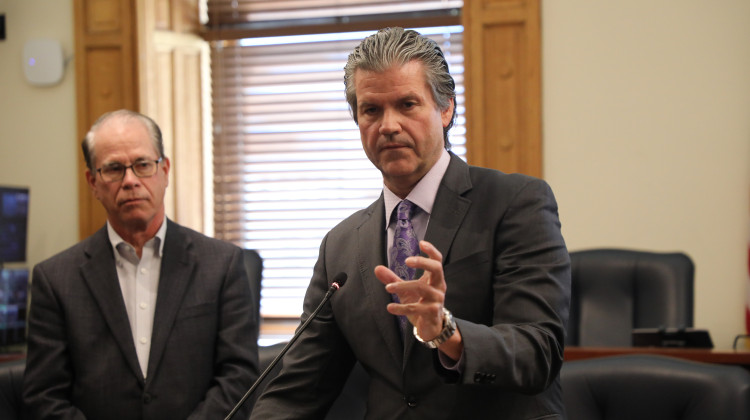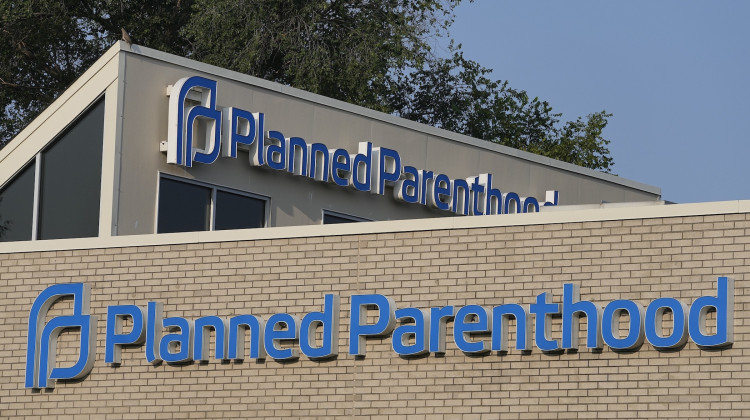This story is part of Essential Voices, a series of interviews with people confronting COVID-19.
Alfarena McGinty is the chief deputy coroner for Marion County, which oversees metropolitan Indianapolis -- which has had the largest outbreak of the new coronavirus in the state. She spoke with Side Effects reporter Carter Barrett about what it’s been like on the front lines of the county’s morgue, tough choices during this crisis, and how the pandemic reached personal life too.
This transcript has been edited for clarity and length.
McGinty: I've been with the Marion County Coroner's Office for 22 1/2 years. This pandemic has been like nothing I've ever experienced in my entire career.
Initially, at the beginning of the year we sort of thought, ‘Well, perhaps it's not going to hit the U.S. like we had seen in other countries.’ And slowly beginning around the beginning of March, we started to see more and more deaths related to COVID.
So we thought we better get prepared just to have something available, because we knew we were already teetering on the brink of having enough storage, understanding that we could only take on an additional one or two additional cases. We thought we should go ahead and prepare to have additional cooling units available to us in our parking lot.
We just went ahead and ordered the temporary coolers. Then we started to get calls, even from hospitals, saying that they had run out of storage space to store deceased. And so with that, they were asking for our help. And so then we have to go to the bigger plan. If one hospital starts to become overwhelmed, we were almost positive that the other hospitals were going to have the same problem.
As you have seen, the black community has been significantly impacted by COVID. We have seen more African Americans die as a result of COVID. And so with a limited number of African-American funeral homes, they can only handle so many decedents at a time and preparing and prepping for funerals, along with the other regular operations that they're seeing.
Also, we have the additional coolers that are outside of our office for our Marion County COVID death investigation cases, meaning the ones that don't die at the hospital. The decedents that die at the scene that have had symptoms that we need to test. Then we have moved to the larger facility that can hold up to 750 decedents and those are strictly hospital cases.
It's scary. I personally have also been impacted by a COVID death in my family. My aunt whose husband died last week. She has also tested positive, so she's quarantined. So her ability to either make funeral arrangements is delayed with trying to get things taken care of is difficult enough for her dealing with her own health and now you know, the loss of my uncle, her husband, and trying to make funeral arrangements and not feeling well.
It’s very difficult to try to, you know, take care of things when this is sudden and unexpected. These are deaths that are, you know, happening very quickly. So it's not like you are planning or preparing for a terminal illness. And so you're talking about being able to try to make decisions very quickly, because the funeral homes have to move on to their next case.
I mean, I really had to tell my aunt today that she probably would not be able to see my uncle because it's a highly infectious disease. We don't know how long it lives on the body or any other surface. So there's so many things that we are not able to get closure on in terms of, you know -- typically you would be able to see your loved one at the funeral or after the funeral home has prepared them for their final disposition. And in this case, she's not able to do that. And so it's been a challenge.
It's scary. I hope that we never have to fill the facility that we have obtained for the projection and I pray that there is something that happens miraculously, where we don't have to put a single decedent in that facility.
---
Since this interview was recorded, one of the four overflow units has been utilized by the coroner's office. McGinty says since fewer people are dying at home or outside hospitals they will return the additional units.
If you have a personal story to share from the frontlines of this pandemic, wherever that may be, send us an email -- health@wfyi.org.
This story was produced by Side Effects Public Media, a news collaborative covering public health.
 DONATE
DONATE









 Support WFYI. We can't do it without you.
Support WFYI. We can't do it without you.